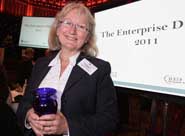The award, a new element within the New Enterprise Competition 2011 run by Research, Enterprise and Development (RED), celebrates exemplars of the impact of research undertaken at the University of Bristol.
Approximately one in 1,000 babies born at term suffer lack of oxygen during labour and delivery severe enough to injure the brain. In the past, seventy per cent either died, or survived with cerebral palsy and learning disability. Although neonatologists could help many of these babies survive, there was no treatment to reduce brain injury and disability.
The treatment developed by Professor Thoresen involves recognising when an infant in poor condition at birth shows signs of brain injury and lowering the core body temperature to 33.5°C for 72 hours, then very slowly raising it.
A central principle of neonatal nursing for over a hundred years has been that a nurse does not let a sick baby become cold. Thus the idea of deliberately cooling a critically ill baby for 72 hours was genuinely revolutionary when Professor Thoresen first introduced the treatment – known as therapeutic hypothermia – at Southmead and St Michael’s Hospitals, in 1998.
Therapeutic hypothermia is now approved by the National Institute for Health and Clinical Excellence (the organisation responsible for providing national guidance on promoting good health and preventing and treating ill health), and is provided by tertiary neonatal intensive care units in all regions of the UK. In the developed world, 1,500 babies are saved from death or severe disability every year.
Dr David Main, Dr Becky Whay, Dr John Tarlton and Dr Toby Knowles of the School of Clinical Veterinary Science were runners-up for the impact of their research into reducing lameness in UK dairy cattle.
Their work began in 1995 with fundamental research underpinning the understanding of the causes of cattle lameness and why the disease has such devastating welfare consequences for cows. It has continued through to the implementation of lameness control programmes on UK dairy farms, leading to substantial reductions in lameness on the farms involved.
It has involved collaborations with many sectors of the dairy industry, including farmers, dairy companies (MilkLink, OMSCo, Long Clawson, Dairy Crest) and farm assurance schemes (RSPCA Freedom Food, Soil Association and Assured Dairy Farms). The research has led directly to the UK levy board for dairy cattle (DairyCo) implementing a national lameness control strategy.
The awards were presented the annual Enterprise Dinner, which also celebrated the winners of the New Enterprise Competition and the University’s Engagement Award. The New Enterprise Competition celebrates student and staff business ideas, and the Engagement Award recognises the efforts of staff to participate in public engagement activity.
For more information about any of these awards, please contact dave.jarman@bristol.ac.uk.
